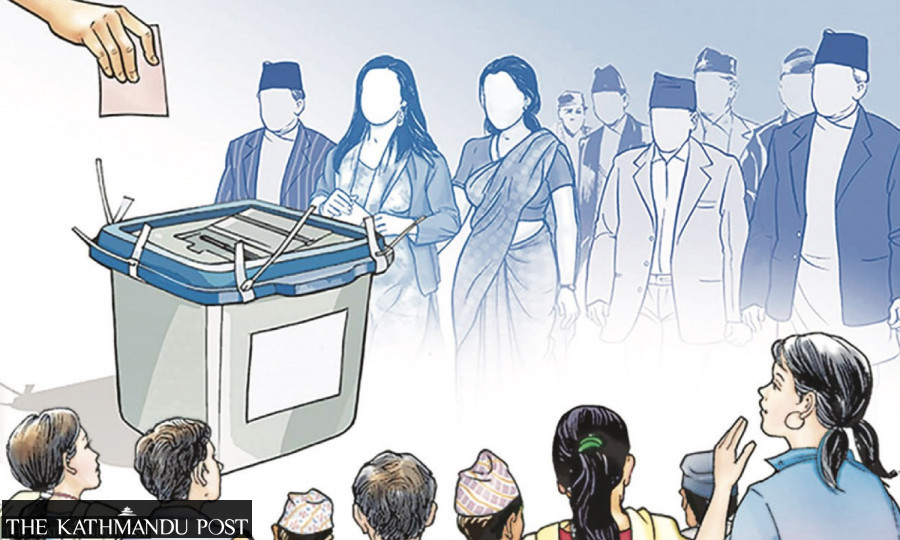Politics
What’s the mandate of Nov 20 polls?
The message from voters is that the traditional parties should reform or they will perish.
Purushottam Poudel
Nepali voters, who in 2017 had given a thumping majority to the then left alliance to rule the country for five years, this time gave no clear mandate in the November 20 polls.
In a parliamentary system, the party that wins most seats in parliament forms the government. As matters stand, no political party has a majority while the Nepali Congress is poised to be the largest party.
So it was natural for the grand old party to claim government leadership and take the initiative to cobble together a ruling coalition. The Congress-led five-party electoral alliance is likely to stump up a majority in the House of Representatives in order to elect the prime minister.
But leaders from other political parties have also announced their claim for the government leadership and approached smaller parties for the same.
CPN-UML, which has emerged the second-largest party in the federal lower house, has approached CPN (Maoist Center) and other fringe parties in a bid to break the Congress-led alliance and stitch together a new governing coalition.
“As no party has a majority in the House of Representatives, UML will take the initiative to lead the government,” UML vice-chair Bishnu Poudel said at a press meet on Monday.
Another vice-chair of the party Subas Nembang echoed Poudel on Friday. Nembang told a group of journalists that his party would talk to all the political forces on government formation. The party’s deputy general secretary Prithvi Subba Gurung has been even more vocal about the need to form a new government under UML leadership. “We have the strength to form governments at both federal as well as provincial levels and we should actively work to break the Congress-led alliance,” Gurung said at a function in Kathmandu on Friday.
Within the Congress-led alliance, CPN (Maoist Centre) Chairman Pushpa Kamal Dahal, who had reportedly reached a gentleman’s agreement with Congress President Sher Bahadur Deuba to head the government by turns, is now trying to be prime minister in the first half of the five-year term.
With his party emerging as the third-largest parliamentary force, Dahal has tried to benefit from his position as a kingmaker in the House. Despite their bitter rivalry, UML chair KP Sharma Oli last week phoned Dahal and proposed to join hands to form the next government.
Political observers say the major parties did not heed the public before the elections.
Two major political parties, the Congress and the UML, led competing electoral alliances in the run-up to the November polls. The Congress-led alliance spanned the country while the UML-led alliance was active in a limited number of electoral constituencies. Yet, in each alliance, parties with polar opposite ideological orientations had partnered with each other—just to lock in some seats.
“While forging coalitions, the parties had confused the public as they had made alliances with parties with contradictory ideologies, which was against the public aspiration,” senior journalist Kanak Mani Dixit told the Post. “The mandate of this election is the rejection of coalitions among parties with contradictory ideologies.”
While the traditional political parties suffered setbacks, some newly-formed ones like the Rastriya Swatantra Party (RSP), Nagarik Unmukti Party (NUP) and Janamat Party (JP) got considerable public backing in the November elections.
Experts say old parties have been warned and new ones have been encouraged to take their place.
“The three new outfits have between them gotten just 16 percent of total votes under the proportional representation system,” political economist Dambar Khatiwada told the Post. “They most certainly don’t have the mandate to rule the country.”
He said that the only clarity from the November 20 vote is the rejection of the traditional way of doing politics. “Therefore, the mandate of this election is that traditional parties should change their governing style,” said Khatiwada.
“The mandate is that none of the traditional parties is good enough to rule the country on its own,” he added. “The larger message, again, is that political parties should focus on delivery and people-centric politics.”
Congress-affiliated political analyst Shankar Tiwari said that this election’s message is that, in order to stay relevant in the changed context, even the established parties should encourage youth leaders within their ranks.
“The mandate of this election is that the traditional parties have no alternative but to give more space to youth leaders in order to resist the challenge posed by the newer parties,” said Tiwari.
However, Khatiwada, the political economist, believes voters also did not ask for a change in leadership.
“When old faces like Sher Bahadur Deuba, KP Sharma Oli, Pushpa Kamal Dahal and Madhav Nepal have won with respectable votes, it would be immature to claim that voters wanted to do away with the older lot,” Khatiwada said. “The primary mandate of this election is rather that political parties and their leaders should be accountable to the public.”




 18.12°C Kathmandu
18.12°C Kathmandu















